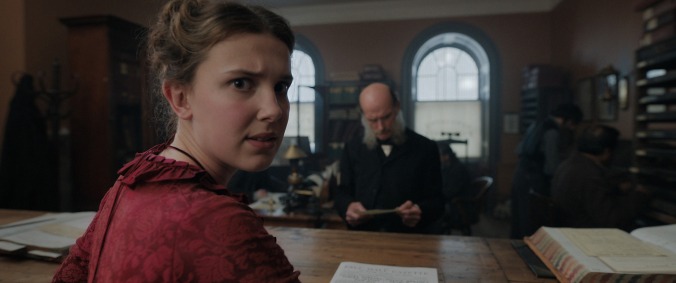Millie Bobby Brown solves a dull mystery in Netflix’s disappointing Enola Holmes


Earlier this year, the estate of Arthur Conan Doyle sued Netflix over the new film Enola Holmes—as well as the author of the kids’ books that serve as its source material—for violating copyright on 10 Sherlock Holmes stories. While many of the most famous Holmes adventures remain in the public domain, the Doyle estate owns some later-period texts where Holmes shows greater empathy toward his fellow man—and woman. Ergo, the estate feels that by portraying a less aloof and more emotionally conflicted Sherlock, Enola Holmes has dipped into copyrighted work without permission. It seems like hair-splitting to quibble over a character that’s been freely adapted countless times, and to claim ownership of basic qualities possessed by many, many characters, including plenty of past Sherlock incarnations. But the suit and the movie itself do raise an interesting question: How many changes can a character undergo while still remaining essentially Sherlock Holmes?
In Enola Holmes, Sherlock’s empathy is piqued not by a particular case but by his semi-estranged younger sister, Enola (Millie Bobby Brown). Born when Sherlock (Henry Cavill) and older brother Mycroft (Sam Claflin) were already nearly grown, Enola was raised alone by the Holmes matriarch Eudoria (Helena Bonham Carter), who home-schooled her only daughter in history, literature, various sports, and hand-to-hand combat, among other subjects. When Eudoria goes missing, Enola’s private world is shattered, and neither Sherlock nor Mycroft want to involve her in the search. Government official Mycroft insists on sending her to finishing school; Sherlock goes along with this plan while ambivalence nags at him. Before the matter can be fully settled, Enola escapes to turn-of-the-century London, putting her vast knowledge and lack of real-world experience to the test as she looks for her mother.
The nature of Eudoria’s disappearance is less intriguing than mildly confusing. Enola considers her missing as soon as she wakes up one morning without her mother around the house. Has she never stepped out to run an errand? Shortly thereafter, Enola’s presented with a bespoke box of keepsakes and coded messages, making it clear that she’s supposed to track her mom down. This sets the pattern for the rest of Enola Holmes, where this successor to the world’s greatest detective spends much of her time parsing clues that have been prepared and left for her. (She’s definitely well-equipped to fight the Riddler.) Even when Enola’s purview expands to solve the case of another (voluntarily) missing person, the young and handsome Lord Tewksbury (Louis Partridge), her sleuthing stays on the light side.
Sherlock, meanwhile, does mild detective work while brooding over Enola’s fate, and Mycroft has been recalibrated as an average intellect, jealous of his siblings’ natural abilities and concerned only with maintaining social status. The movie seems far more interested in illustrating Enola’s physical prowess. Has the Guy Ritchie version of Holmes lived so vividly in the popular imagination that violent altercations are considered more vital to Holmesian characters than deductive powers? Maybe the filmmakers just don’t trust their young audience to follow along with anything more complicated than word scrambles. That tracks with the movie’s tendency to underline points and repeat itself. Information conveyed in the short-attention-span montage covering Enola’s childhood is re-established with additional quick flashbacks, sometimes treating the material as a brand-new revelation.
Without much of a mystery to solve, this young Holmes comes across more like a junior-level Wonder Woman: intelligent and highly trained yet puzzled by this unfamiliar, unfair world of men. She also has the smallest touch of the unnamed heroine from Fleabag, which director Harry Bradbeer worked on; Brown performs direct-to-camera asides that often imitate the rhythm of that show’s staccato fourth-wall breaks. The movie clearly positions Enola as a “wild and dangerous woman,” as her mother is characterized early on. One problem is that Eudoria herself barely exists beyond this description; she speaks primarily in fridge-magnet bromides like “You have to make some noise if you want to be heard,” and barely shares as much as a fully written scene opposite her onscreen daughter.
For her first unequivocal film lead, Brown plays Enola with excited energy, but she can’t overcome the lack of a Watson figure to play off. The idea of a young, female version of Sherlock Holmes using her gifts to fight the patriarchy during England’s women’s-suffrage movement is a potentially rich one, and maybe the book series has the time to actually explore it. This would-be franchise kick-off is all about establishing characters who hardly merit a second look: Enola is generically plucky, while Cavill makes a surprisingly dull Sherlock, misapplying the uprightness he’s conveyed in American-accented roles as Superman or Napoleon Solo. The Arthur Conan Doyle estate needn’t fret over unauthorized cribbing. All that’s really left of Holmes here is the name.